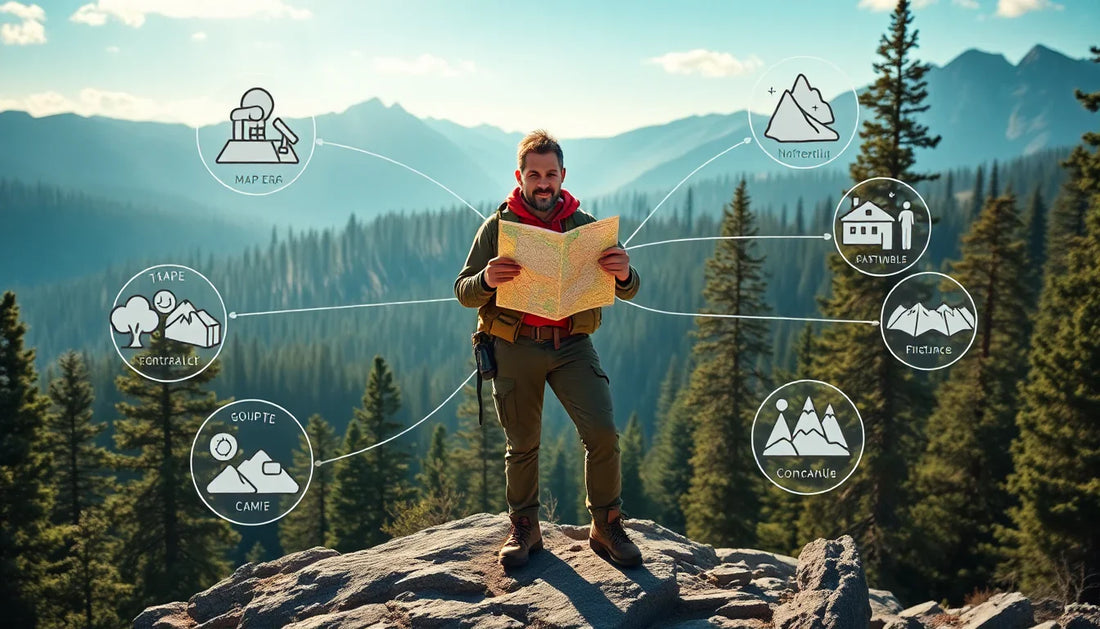
Essential Navigation Skills Every Camper Should Learn
Share
Embarking on an outdoor adventure is an exhilarating experience, but it also comes with inherent risks. One of the most crucial skills every camper should possess is the ability to navigate effectively and safely through the wilderness. Whether you're trekking through dense forests, scaling rugged mountains, or exploring uncharted territories, mastering essential navigation techniques can mean the difference between a successful, memorable trip and a potentially dangerous situation.
At GlowCamp, we believe that equipping our customers with the right knowledge and tools is just as important as providing high-quality camping gear. In this blog post, we'll delve into the fundamental navigation skills every camper should learn, from basic map reading to advanced orienteering techniques. By the end, you'll be better prepared to confidently explore the great outdoors and make the most of your camping adventures.
Basic Map Reading Skills
The foundation of effective navigation lies in understanding how to read and interpret maps. While GPS devices and digital navigation apps have become increasingly popular, it's crucial to have a solid grasp of traditional map-reading skills as a backup or in areas with limited connectivity.
Start by familiarizing yourself with the different types of maps, such as topographical maps, road maps, and trail maps. Learn to identify and interpret the various symbols, legends, and scale indicators on the map. Understanding the terrain features, elevation changes, and distance measurements will help you plan your route and anticipate any challenges along the way.
Practicing map-reading skills in familiar areas can help you build confidence and prepare for more complex navigation scenarios. Experiment with measuring distances, estimating travel times, and identifying landmarks on the map before venturing into unfamiliar territory.
Compass Navigation Fundamentals
The humble compass is a timeless tool that has guided explorers for centuries, and it remains an essential piece of equipment for any camper. Mastering the basics of compass navigation will allow you to orient your map, determine your direction of travel, and navigate through the wilderness with greater precision.
Start by understanding the different parts of a compass, such as the housing, the needle, and the degree markings. Learn how to properly orient your map using the compass, ensuring that the directions on the map align with the actual terrain. Practice taking bearings and following them to reach your desired destination.
It's important to note the difference between magnetic north and true north, as this can affect your compass readings. Familiarize yourself with the concept of magnetic declination and learn how to adjust your compass accordingly.
GPS and Digital Navigation Tools
While traditional navigation methods are essential, modern technology has also revolutionized the way we explore the outdoors. GPS devices and navigation apps can be incredibly useful tools, providing real-time location tracking, route planning, and even offline maps.
Explore the features and capabilities of various GPS devices and apps, and consider the pros and cons of each. Understand the importance of having a backup power source and offline maps, as you may encounter areas with limited or no cellular coverage.
Remember that digital tools should be used in conjunction with, not as a replacement for, your basic navigation skills. Develop a solid understanding of how to use these technologies effectively and know how to navigate without them in case of emergencies or equipment failure.
Traditional Orienteering Techniques
While GPS and digital tools can be incredibly helpful, it's essential to also master traditional orienteering techniques. These time-honored methods can serve as a reliable backup and help you develop a deeper understanding of your surroundings.
Learn the art of dead reckoning, which involves estimating your position and direction of travel based on your starting point, distance traveled, and direction faced. Familiarize yourself with triangulation, using landmarks and terrain features to pinpoint your location on the map.
Explore the use of natural navigation cues, such as the position of the sun, stars, and natural landmarks, to determine your direction and orientation. These skills can be particularly useful in remote areas or during emergencies when technology may not be available.
Safety and Preparation
Effective navigation is not just about finding your way; it's also about ensuring your safety and preparedness. Before embarking on any outdoor adventure, take the time to plan your route thoroughly, considering factors such as terrain, weather conditions, and potential hazards.
Ensure that you have all the necessary navigation tools, including a map, compass, and any relevant digital devices, and that you know how to use them properly. Pack extra batteries or portable chargers to keep your equipment powered, and familiarize yourself with emergency navigation strategies in case you become lost or disoriented.
Remember, the key to safe and successful navigation is continuous learning and practice. Seek out opportunities to hone your skills, whether through formal training, outdoor workshops, or simply exploring new areas with a map and compass in hand.
Practical Navigation Training Tips
Developing strong navigation skills takes time and dedication, but the rewards are well worth the effort. Start by practicing in familiar, low-risk areas, such as local parks or hiking trails, to build your confidence and experience.
Engage in skill-building exercises, such as following a predetermined route on a map, navigating to specific landmarks, or practicing triangulation techniques. Consider joining a local outdoor club or attending navigation workshops to learn from experienced instructors and connect with like-minded adventurers.
There are also numerous resources available online and in print that can help you deepen your understanding of navigation principles and techniques. Explore books, tutorials, and online communities dedicated to outdoor education and skill development.
Conclusion
Mastering essential navigation skills is a crucial aspect of any successful camping or outdoor adventure. By combining traditional techniques with modern digital tools, you can navigate the wilderness with confidence, enhance your safety, and make the most of your time in nature.
At GlowCamp, we believe that empowering our customers with the right knowledge and skills is just as important as providing high-quality camping gear. We encourage all our customers to invest time and effort into developing their navigation abilities, as it will not only enrich their outdoor experiences but also help them become more self-reliant and resilient explorers.
So, whether you're a seasoned camper or just starting your outdoor adventure journey, take the time to master the essential navigation skills outlined in this blog post. With the right knowledge and practice, you'll be well on your way to confidently navigating the great outdoors and creating unforgettable memories along the way.
